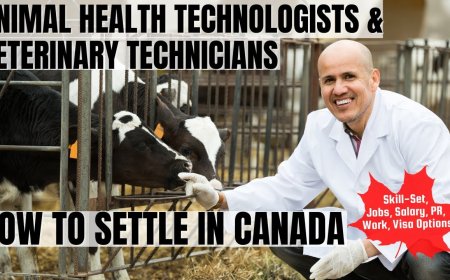Veterinarians Canada Immigration Pathways: Understanding Salaries, Work Roles, and Best Provinces
Welcome to the pathway to Canada immigration for skilled professionals and trade workers. This guide is specifically tailored for Veterinarians looking to work and settle in Canada, offering a deep dive into the essential aspects of immigration and employment in this field.
Introduction
Veterinarians play a crucial role in ensuring the health and well-being of animals. In Canada, the demand for skilled veterinarians is on the rise, creating promising career opportunities for those in the field. In this article, we will explore the profile of Veterinarians, including their main job duties, education and licence requirements, necessary skills, median age and retirements, as well as salary details. Additionally, we will discuss possible visa options for those looking to immigrate to Canada to pursue a career in veterinary medicine.
What is the Profile Description of a Veterinarians as per the Canadian National Occupation Classification (NOC) Standards?
Veterinarians play a vital role in the health and wellbeing of animals by preventing, diagnosing, and treating illnesses and injuries. They also provide guidance to clients on proper animal care practices including nutrition, hygiene, and housing. Veterinarians may work in various settings such as private practices, animal clinics, farms, laboratories, government agencies, or within the industry. Their expertise is essential in ensuring the overall health and welfare of animals.
What are the Main Job Duties of a Veterinarians in Canada?
- Diagnose diseases and abnormal conditions in animals through physical examinations and laboratory tests
- Treat sick or injured animals by prescribing medication, performing surgery, and providing medical care
- Provide vaccinations to prevent and treat diseases in animals
- Advise clients on animal care, including feeding, housing, behavior, breeding, and hygiene
- Conduct research in veterinary medicine related to animal nutrition, health care product development, and disease prevention
What are the Education, Certifications, and Licensing Requirements to Work as Veterinarians in Canada?
In order to become a Veterinarian, candidates must have completed two years of pre-veterinary university studies or a college program in health science. This is followed by a four to five year university degree in veterinary medicine and passing national certification examinations. Additionally, a provincial license to practice is necessary for all aspiring Veterinarians. For those interested in research positions, further post-graduate study may be required to gain entry into this field.
What Essential Skills are Required for Veterinarians to succeed in Canada?
Veterinarians require a diverse set of essential skills to be successful in their profession. They must be adept at diagnosing diseases or abnormal conditions in individual animals, herds and flocks through physical examinations or laboratory tests. In addition, they need to be skilled in treating sick or injured animals by prescribing medication, setting bones, dressing wounds or performing surgery, as well as vaccinating animals to prevent and treat diseases. Veterinarians must also have strong communication abilities to advise clients on feeding, housing, behaviour, breeding, hygiene and general care of animals. Furthermore, they need to be proficient in performing routine, emergency and post-mortem examinations, as well as providing a range of veterinary services such as obstetrics, dentistry and euthanasia. Overall, successful veterinarians must possess a combination of medical knowledge, practical skills, compassion, and excellent communication abilities to effectively care for animals.
What is the Median Age and Retirement Age for Veterinarians in Canada?
The median age of skilled professionals working as Veterinarians is 43 years old, while the average retirement age for individuals in this profession is 65 years old. This suggests that veterinarians typically have a long and fulfilling career, with many of them choosing to continue working well into their later years. The dedication and passion for their work is evident in the fact that they choose to remain in the field even after reaching retirement age. This also indicates that the skills and expertise acquired through years of experience are highly valued in the veterinary profession.
How many job openings exist for Other Veterinarians in Canada, and what's their provincial distribution?
Canada has a total of 39 job openings for the profile of Veterinarians. The province with the highest number of job openings is British Columbia with 9 positions available, followed by Québec with 8 openings and Ontario with 7 openings. Alberta has 6 job openings, while Manitoba and Nova Scotia each have 3 and 2 openings, respectively. Saskatchewan, New Brunswick, and Newfoundland and Labrador each have 2, 1, and 1 job openings, respectively. British Columbia has the most job openings for Veterinarians, while New Brunswick and Newfoundland and Labrador have the least number of job openings. Applicants looking for opportunities in the field of veterinary medicine should consider exploring job opportunities in these provinces.
What is the hourly wage or salary of Veterinarians in different Provinces of Canada?
In Canada, the wages for Veterinarians vary by province. In British Columbia, the high wage for Veterinarians is $141,503, the median wage is $85,140, and the low wage is $35,894. In Alberta, Veterinarians earn a high wage of $145,253, a median wage of $96,817, and a low wage of $41,090. Saskatchewan offers a high wage of $131,550, a median wage of $83,911, and a low wage of $24,933 for Veterinarians. In Manitoba, Veterinarians earn a high wage of $129,322, a median wage of $86,801, and a low wage of $27,001. Ontario offers a high wage of $148,842, a median wage of $83,697, and a low wage of $30,296 for Veterinarians. Quebec provides a high wage of $130,549, a median wage of $83,200, and a low wage of $40,081 for Veterinarians. Lastly, in Nova Scotia, Veterinarians earn a high wage of $104,357, a median wage of $73,259, and a low wage of $27,273. It is evident that there is a significant variation in wages for Veterinarians across different provinces in Canada, with provinces like Ontario and Alberta offering higher wages compared to others like Nova Scotia and Saskatchewan.
What are the various visa options available for Veterinarians migrating to Canada?
Veterinarians are currently in high demand in Canada and are eligible for Category based Express Entry Invitation draws for Canadian Permanent Residency under the Healthcare Occupations Category. The Express Entry system is a way for skilled workers to immigrate to Canada as permanent residents based on their skills and work experience. In addition to Express Entry, Veterinarians can also explore Provincial Nominee Programs and Employer Sponsored Work Visas to immigrate to Canada. These programs offer different pathways for veterinarians to obtain a work permit or permanent residency in Canada. There may also be other visa options available for veterinarians looking to migrate to Canada. To learn more about the various migration options and discuss your eligibility, book an appointment with our immigration professionals today.
Have Questions or Need Assistance?
If you have any queries or require assistance with your immigration plans, we're here to help. Our experienced immigration consultants are ready to provide personalized guidance tailored to your specific needs.
Don't hesitate to reach out and schedule an appointment today. Whether you're seeking clarification on immigration processes, exploring visa options, or need support with documentation, we're dedicated to assisting you every step of the way.
Book an appointment with our team to discuss your immigration goals and receive expert guidance for your journey to Canada.
What's Your Reaction?
 Like
0
Like
0
 Dislike
0
Dislike
0
 Love
0
Love
0
 Funny
0
Funny
0
 Angry
0
Angry
0
 Sad
0
Sad
0
 Wow
0
Wow
0






































































